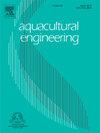Effect of drum filter mesh size on RAS water quality
IF 4.3
2区 农林科学
Q2 AGRICULTURAL ENGINEERING
引用次数: 0
Abstract
Drum filters play an important role in recirculating aquaculture systems (RAS) by removing particulate matter from production units. Optimizing their performance has significant importance for water quality as well as investment and running costs. One important parameter affecting both issues is the mesh size applied. This study investigates the impact of drum filter mesh size (70, 45, and 30 µm mesh size and a control group without drum filters) on water quality and system performance in a triplicate trial using rainbow trout (Oncorhynchus mykiss), for a period of eight weeks. The use of drum filters led to significantly less particulate organic matter in the RAS water (more than 60 % reduction in particles, particulate BOD, and particulate COD) as well as reduced microbial activity (50 % reduction of microbial activity in water), while no significant reduction in dissolved organic matter was observed. The removal of particulate organic matter led to improvements across most metrics studied. The study demonstrated that mechanical filters had positive effects on water quality parameters and that reducing mesh size from 70 µm to 45 µm led to further improvements in most water quality parameters, while an additional reduction to a 30 µm mesh did not further improve water quality. The findings underscore the importance of particle removal, mesh size selection, and system design to ensure the best removal rates while maintaining maximum filtration capacity. Interestingly, the changes in water quality achieved by the drum filters led to an improvement in feed utilization resulting in increased biomass production. The results suggest that optimizing drum filter mesh size, particularly utilizing 45 µm mesh, can enhance water quality and perhaps operational profitability in RAS.
鼓式滤网孔径对RAS水质的影响
鼓式过滤器通过去除生产单元中的颗粒物,在循环水养殖系统(RAS)中发挥重要作用。优化其性能对水质、投资和运行成本具有重要意义。影响这两个问题的一个重要参数是应用的网格尺寸。本研究以虹鳟鱼(Oncorhynchus mykiss)为研究对象,在为期八周的三次试验中,研究了鼓式过滤器网目尺寸(70、45和30 µm网目尺寸以及不使用鼓式过滤器的对照组)对水质和系统性能的影响。使用鼓式过滤器可显著减少RAS水中的颗粒有机物(颗粒、颗粒BOD和颗粒COD降低60% %以上),并降低微生物活性(水中微生物活性降低50% %),但未观察到溶解有机物的显著减少。去除有机颗粒物质导致了所研究的大多数指标的改善。研究表明,机械过滤器对水质参数有积极的影响,将滤网尺寸从70 µm减小到45 µm可以进一步改善大多数水质参数,而将滤网尺寸进一步减小到30 µm并不能进一步改善水质。研究结果强调了颗粒去除,网格尺寸选择和系统设计的重要性,以确保最佳的去除率,同时保持最大的过滤能力。有趣的是,通过鼓式过滤器实现的水质变化导致了饲料利用率的提高,从而增加了生物质产量。结果表明,优化鼓式过滤器滤网尺寸,特别是使用45 µm滤网,可以改善水质,并可能提高RAS的运营盈利能力。
本文章由计算机程序翻译,如有差异,请以英文原文为准。
求助全文
约1分钟内获得全文
求助全文
来源期刊

Aquacultural Engineering
农林科学-农业工程
CiteScore
8.60
自引率
10.00%
发文量
63
审稿时长
>24 weeks
期刊介绍:
Aquacultural Engineering is concerned with the design and development of effective aquacultural systems for marine and freshwater facilities. The journal aims to apply the knowledge gained from basic research which potentially can be translated into commercial operations.
Problems of scale-up and application of research data involve many parameters, both physical and biological, making it difficult to anticipate the interaction between the unit processes and the cultured animals. Aquacultural Engineering aims to develop this bioengineering interface for aquaculture and welcomes contributions in the following areas:
– Engineering and design of aquaculture facilities
– Engineering-based research studies
– Construction experience and techniques
– In-service experience, commissioning, operation
– Materials selection and their uses
– Quantification of biological data and constraints
 求助内容:
求助内容: 应助结果提醒方式:
应助结果提醒方式:


